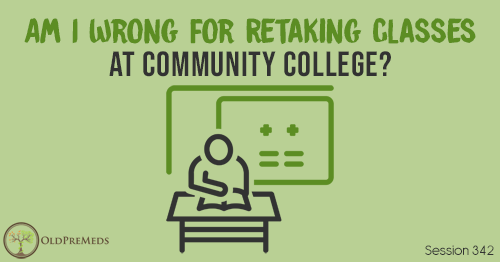Apple Podcasts | Google Podcasts
Session 291
Today’s nontrad is a teacher for Teach for America. They want to know if a postbac is a good idea to raise their GPA, or if their teaching experience is enough.
Questions answered here on the podcast are taken directly from the Nontrad Premed Forum over at premedforums.com. Please go ahead and register for an account, ask your question, and have fun with the community.
Also, please be sure to check out all our other podcasts on Meded Media as we try to bring you as many resources as you need on this journey.
Listen to this podcast episode with the player above, or keep reading for the highlights and takeaway points.
[00:51] The MCAT Minute
The MCAT Minute is brought to you by Blueprint MCAT.
The MCAT registration is opening up soon here in October 2021. There are limited test centers throughout the country. This is not a test that’s available anytime you want to take it whenever you want. Therefore, you need to register for the MCAT as soon as you can so that you have a seat. Make a plan and stick to it.
'Registering for the MCAT as soon as possible is very important. There are limited seats available at each Pearson test center.'Click To TweetSign up for a free Blueprint MCAT account today to get amazing free resources to help with your MCAT prep. Get access to a full-length MCAT practice test, a half-length diagnostic, an amazing online study planner tool, and their brand new Spaced Repetition flashcard platform including 1,600 professionally crafted flashcards to help you on the MCAT.
[02:28] OldPreMeds Question of the Week
“I graduated from college with a 3.2 GPA and will be taking the MCAT soon. But instead of doing postbac, I wanted to teach during my gap years because it has always been a passion of mine. I’m currently teaching high school as a Teach for America corps member.
Do I still have a chance of getting into med school if I apply this cycle? Or does a postbac still seem like the best option?”
[03:03] Why Trends Are So Important
Our student is self-aware enough to know their GPA may not be competitive. But we need to know the trend to know if this is a competitive GPA or not.
If this student’s trend is 2.0, 2.0, 4.0, 4.0. That’s a 3.0 average. On the surface, this doesn’t look great. But medical schools can see your trend and they’re going to think that while you started off slow, you were able to eventually figure things out.
If you treated your third and fourth years as your postbac, and you had a 2.0, 2.0, 4.0, 4.0, then you’re solid. You probably don’t need a postbac. But if that’s flipped and you had a 4.0, 4.0, 2.0, 2.0, that’s a completely different story. That’s why trends are so important.
'The job of a postbac is to prove to the medical schools that you figured it out.'Click To TweetAt the end of the day, what matters is that you’re able to prove your academic capability. Have you assured medical schools that you’re going to do well in medical school? Obviously, you don’t know that yet because you’re not in medical school. And you may be a 4.0 student and still struggle in medical school. But it gives the medical school admissions committees some good idea of your academic capability. Not just your GPA, but also the trends that go with it.
[05:36] When the Trends Don’t Matter
If you’re a 4.0. student, we don’t need to know the trends because it’s a 4.0. If you’re a 3.7 student, we also don’t need to see the trends because you’re a 3.7 student. That’s a really good GPA. And if there’s an upward trend, even with a 3.7 GPA, that’s great. If there’s a downward trend with a 3.7 GPA, that’s also less of an issue because a 3.7 is still a solid GPA.
The trends matter when you’re dealing with lower GPA totals, like a 3.2, just like in this student’s case. Because the trend will show medical schools that this student is academically capable of doing well in medical school. The 3.2 doesn’t tell me that but the trend behind the 3.2 does.”
If it’s 3.2, 3.2, 3.2, 3.2 every single year, then this student has not proven academic capability. If it’s 2.0, 2.0, 4.0, 4.0, then the student has proven academic capability.
If it’s flipped, and it’s 4.0, 4.0, 2.0, 2.0, that’s going to be a cause for concern. Now, even if you still did 4.0 twice, the fact that they stumbled coming into the application cycle is a concern. What is going on in their life? Are they doubting themselves? Are they doubting whether or not they want to go to medical school? Do they have something going on in their life that’s going to continue to affect them in medical school? There are lots of questions around stumbling coming into the application.
[07:43] What Academic Capability Means
Ultimately, the question you have to ask yourself is have you proven academic capability? Now, what that means for each individual medical school is going to vary.
Be at a 4.0 trend-wise for as long as possible or as close to a 4.0 for as long as possible. If you have a 3.0 overall GPA, overall science GPA, but you have a 4.0 over your last 30 or 40 credits, then there’s little concern.
'It's not that final number that ultimately matters, especially for someone with a little bit lower GPA.'Click To TweetAssuming you don’t have any strong upward trend, then the answer is you need to do a postbac to get as close to a 4.0 as possible, for as long as possible. That means 30-40 credit hours. Now, sometimes that doesn’t work. You have to prove first and foremost that you are academically capable of doing well in medical school.
[09:43] Good Enough Stats
Students very often try to “make up” for a bad GPA or a bad MCAT score with what they think are stellar activities. But medical schools don’t care. First and foremost, med schools need to be reassured that you can handle the academic rigor of medical school.
You may be an amazing applicant in terms of extracurriculars. You could be the next Mother Teresa. But if you are not academically capable of finishing medical school, a medical school will not touch you. Because it looks bad on them to accept you to take the government’s money in terms of student loans, and if you fail medical school in a year or two, it’s not good.
Your GPA and your trends have to be good enough. Your MCAT score has to be good enough to reassure the admissions committee that you are academically capable of doing well in medical school. That’s what matters first and foremost. And then everything else matters.
'Holistic review cannot happen if you don't have a proven track record of academic capability, period.'Click To TweetUltimately, find a good balance to scratch your itch. Do something you’re passionate about, and at the same time, prove that you’re academically capable of doing well in medical school.












